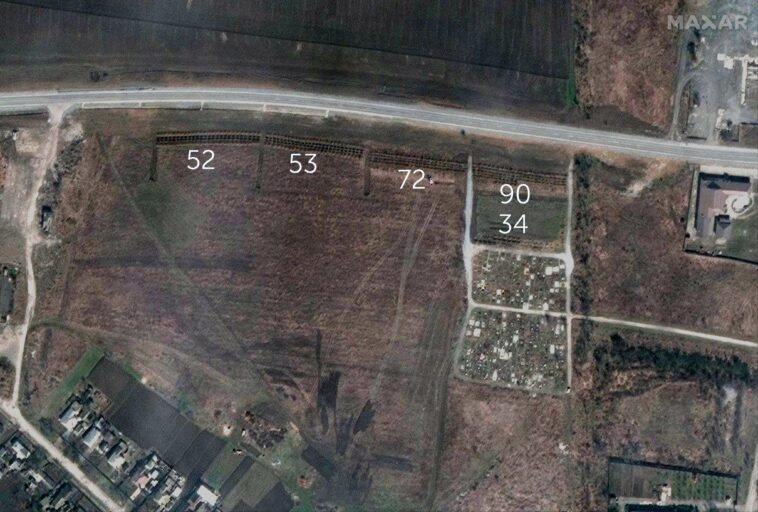Office of the President responds to Russia’s stated goals in war against Ukraine. Russia’s stated aim in the “second phase” of the all-out war against Ukraine is to seize full control of Donbas and southern Ukraine. Advisor to Ukraine’s President Mykhailo Podolyak said the Ukrainian government closely follows what it calls “fresh flashes of Russia’s military propaganda destined to follow the notorious Russian warship.”
“From what the deputy commander of Russia’s central military district Minnekayev publicly said, it appears that Russia has always been lying to everyone. It actually wants to steal part of Ukraine that would give it access to Transnistria where ‘Russian speakers are also repressed’. [Russia’s aim is to] seize the territory, eliminate as many Ukrainians as is possible, and destroy as many Ukrainian cities as they can,” Podolyak said.
Another mass grave on outskirts of Mariupol, up to 1,000 residents buried – city council. The city council of Mariupol said it spotted what appears to be another mass grave site. It is located near a cemetery on the outskirts of Vynohradne village, advisor to Mariupol’s mayor Petro Andryushchenko said.
The mass grave spans 45 meters in length and 15 meters in width, the city council later added referring to satellite images by Planet Labs of April 20. At least 1,000 residents of Mariupol killed by Russian forces are allegedly buried in the mass grave. More and more mass burial grounds will be discovered, their territory to expand, Mariupol’s mayor Vadym Boychenko said.
Ukraine asks EU to ban Russia’s energy imports. Ukraine appealed to the Energy Community Secretariat, the European Union, and member states of the Energy Community Treaty to impose a ban on Russian energy imports.
Advisor to the Minister of Energy Lana Zerkal posted a scanned copy of the appeal on her Facebook page. As Ukraine currently holds the rotating presidency of the Energy Community, it presented a legal proposal.
“The proposal is set to move a discussion on energy embargo away from general phrases and promises toward a formal decision,” Zerkal said.
Ukraine suggests a full immediate embargo on Russian energy imports that can be easily replaced. The decision would ban all imports of coal, oil tankers, fuel, and liquefied natural gas by sea, rail, and road.
Ukraine also suggests to ban Russia’s imports of pipeline oil as a quick measure. It would take effect six to nine months later as the countries would readjust their markets.
Number of Ukrainians returning to country on the rise. Ukraine sees an uptick in number of Ukrainians who return from abroad, the State Border Guard Service said. Between 25 and 30 thousand people enter Ukraine daily. Overall border crossings have largely declined, spokesperson of the State Border Guard Service Andriy Demchenko said.
“Pre-war passenger numbers would be 120-130 thousand a day. A majority would depart Ukraine. Current passenger traffic sits at 60-70 thousand people a day,” Demchenko said.
Ukraine in Flames #43. Why Russian liberal politicians are the threat for Ukrainian victory
As the war goes on, Russian liberal public frequent various broadcasts on Ukraine. Even in the Ukrainian media, Russian opposition politicians, independent journalists and public intellectuals are welcomed as sympathetic speakers. Attention to the Russian liberal voices can be problematic for Ukraine’s success in the war. Ukraine’s victory may be the end to Putin’s regime, but if liberal politicians in Russia took power in the Kremlin, they wouldn’t change its strategy for relations with Ukraine.
Navalny’s 2014 comment about Crimea as a Russian territory illustrated how Russian liberals are susceptible to expansionism. The root causes of Russia’s war against Ukraine began to take shape long before Putin came to power. The predominant Russian narrative through the 20th century was the idea of restoring the Russian empire. Russian liberals supported this narrative before 1917 and throughout the Soviet era, publicly denying Ukraine’s will for independence and devaluing Ukrainian culture as inferior to the great Russian culture. Brodsky’s “On the Independence of Ukraine” greatly summarizes how little liberalism is there in a Russian liberal opposition when the Ukrainian question is at stake.
So, how can the Russian liberals threaten Ukraine’s victory? Can one consider Russian liberalism in isolation from the Russian geopolitical machine? We’ll find out in Ukraine in Flames #43.

